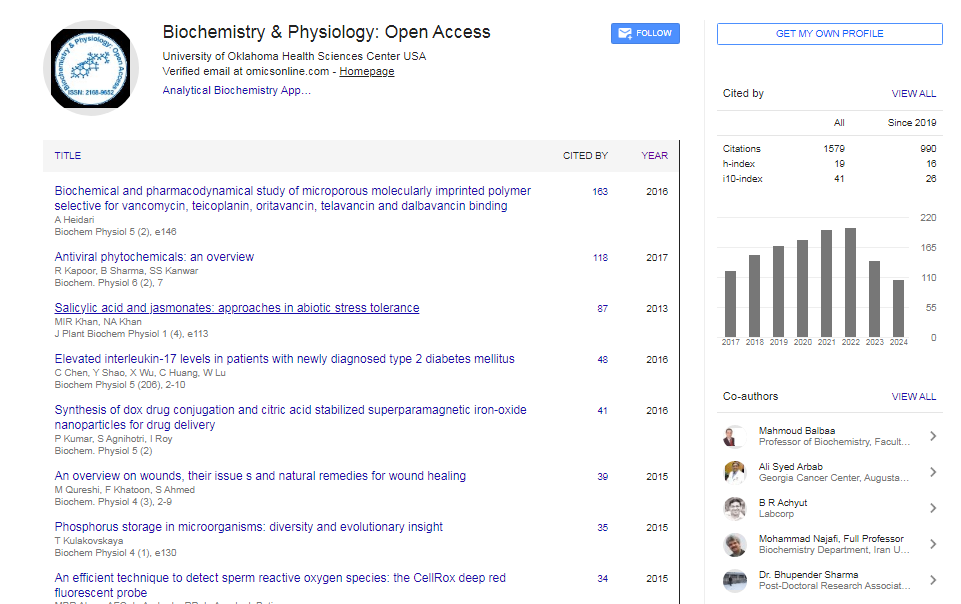Editorial
The Biochemistry of Hunger Stimulating Hormone: Why Understanding This Cascade In Hypothalamus Is Beneficial
| Mahjabin Rashid1, Md. Shariful Islam2, M Salahuddin3*, Md. Sayfullah4, Deluwer Hossain5, MA Momin6, M. Abu Sayed7, Jay Prakash Sah8 and Sanjay Kumar Shah9 | |
| 1College of Medicine, Mymensingh Medical College and Hospital, Mymensingh, University of Dhaka, Bangladesh | |
| 2Department of Biotechnology and Genetic Engineering, Faculty of Life Science, Mawlana Bhashani Science and Technology University, Tangail-1902, Bangladesh | |
| 3Faculty of Medicine, University of Hongkong, Pokfulam Road, Hongkong | |
| 4College of Medicine, Shaheed Ziaur Rahman Medical College Hospital, Bogra, University of Rajshahi, Bangladesh | |
| 5Department of Pharmacology, Bangladesh Agricultural University, Mymensingh-2202, Bangladesh | |
| 6Department of Microbiology and Hygiene, Bangladesh Agricultural University, Mymensingh-2202, Bangladesh | |
| 7Department of Biochemistry and Molecular Biology, Hajee Mohammad Danesh Science and Technology University, Dinajpur-5200, Bangladesh | |
| 8Department of Medical Laboratory Science, School of Health and Allied Sciences, Pokhara University, Lekhnath -12 Kaski, Nepal | |
| 9Department of Medical Laboratory Science, Asian College for Advance Study, Satodobato, Lalitpur, Nepal | |
| Corresponding Author : | M Salahuddin Faculty of Medicine University of Hongkong Pokfulam Road, Hongkong Tel: +852-5584-1096 E-mail: ssdin23@gmail.com |
| Received: July 25, 2015; Accepted: July 25, 2015; Published: August 01, 2015 | |
| Citation: Rashid M, Islam MS, Salahuddin M, Sayfullah M, Hossain D, et al. (2015) The Biochemistry of Hunger Stimulating Hormone: Why Understanding This Cascade In Hypothalamus Is Beneficial. Biochem Physiol 4:e139.doi: 10.4172/2168-9652.1000e139 | |
| Copyright: © 2015 Rashid M, et al. This is an open-access article distributed under the terms of the Creative Commons Attribution License, which permits unrestricted use, distribution, and reproduction in any medium, provided the original author and source are credited. | |
Abstract
Ghrelin is the key hormone responsible for our hunger stimulate to food intake in body system. At present a huge number of people suffer from obesity, so understanding the mechanisms by which various hormones and neurotransmitters have influence on energy balance has been a subject of current research in neuroscience. At present ghrelin is the only known gastrointestinal hormone that increases food intake where Plasma ghrelin levels are inversely correlated with body weight and rise following weight loss in humans. It is a natural ligand of the growth hormone (GH) secretagogue (GHS) receptor type 1a (GHS-R1a). The GHS-R is highly expressed in the hypothalamus, but is also found in the brainstem, pituitary, GI tract, adipose tissue and other peripheral tissues. Ghrelin is still recognized as a potential drug target for weight regulation. The main objective of this is to summarize the current knowledge and optimize about the physiology and pathophysiology of ghrelin in food intake regulation.

 Spanish
Spanish  Chinese
Chinese  Russian
Russian  German
German  French
French  Japanese
Japanese  Portuguese
Portuguese  Hindi
Hindi 